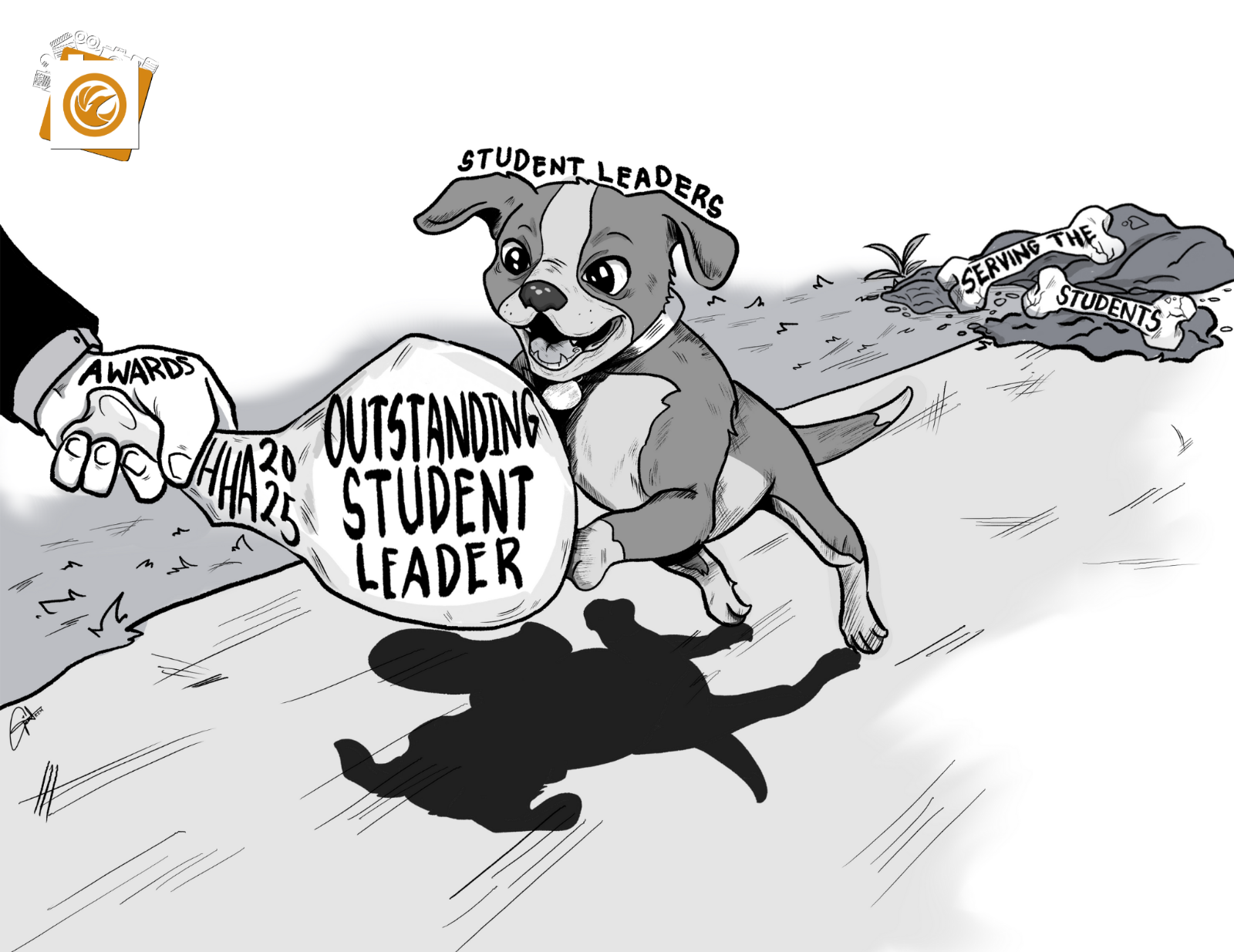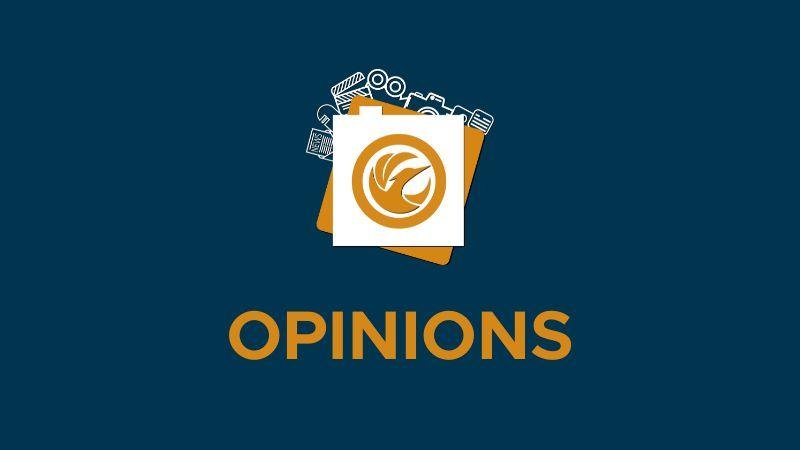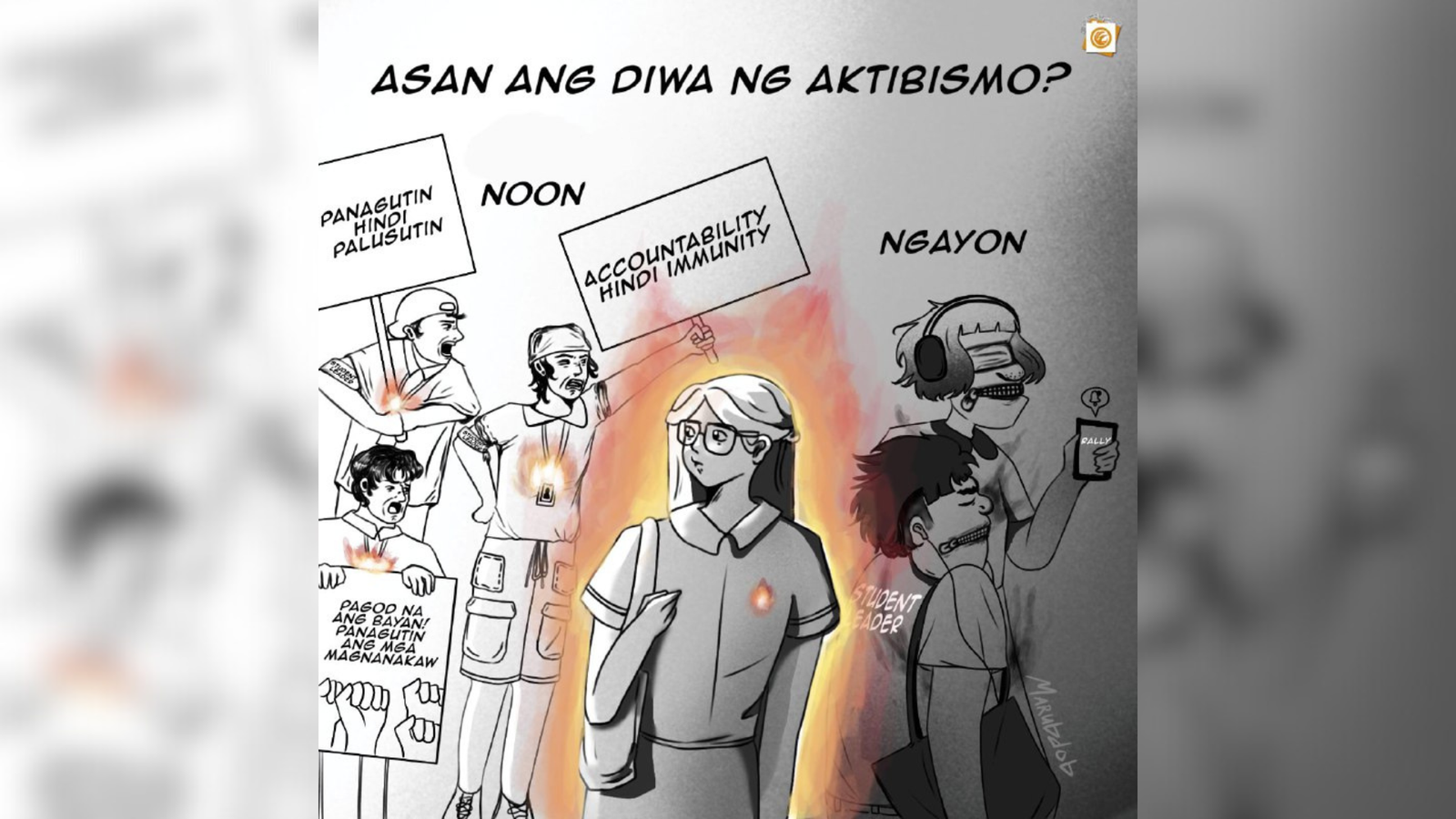DISCLAIMER | The views and opinions of USMO expressed in this article on UMak.edu.ph do not represent those of the University of Makati, its administrators, staff, or students.
Student leadership is meant to serve, not to perform. But today, some student leaders seem more driven by recognition than responsibility—conditioned, like in Pavlov’s study, to respond to rewards rather than purpose.
The student leadership culture at the University of Makati is like a vast ocean filled with different councils, local organizations, and groups. Every year, student elections come and go with flashy posters on social media, party lists everywhere, and the same platforms recycled with new and old faces. However, behind the attractive posters and campaign videos lies a serious question: Do the students running for election intend to serve the students or merely gain recognition?
Commission on Student Elections (COSEL) facilitates annual student elections for the College Student Council (CSC). The campaign season was over; it’s time to elect the next student leaders for the Academic Year 2025- 2026. Since then, numerous student leaders have risen to run as rumors spread among the students.
Some of these rumors have spread on social media through the anonymous confession wall or Facebook groups. These platforms, namely, Herons Confession Wall, started in October 2024, and the UMak Herons Update—a private Facebook group for the UMak community—were used to share anonymous messages and rants about the student leaders, particularly in the College Student Council (CSC). Some students and alumni criticize the candidates running for the election and bring up past and current issues they have experienced in their respective colleges.

AUTHENTIC vs PERFORMATIVE LEADERSHIP
Most student leaders running for positions every campaign season carry promises and platforms to attract votes. There is a difference in how these leaders present themselves—are these leaders showing their true selves or just pretending behind a mask?
It is observed by the student body that some student leaders are only active when it’s election time or award season. Still, when they’re experiencing unprecedented shortcomings in the council, some are nowhere to be found. The concerns of students are not addressed, and it ends with the fact that their platforms during campaign season are just presumed advocacies.
“Ito yung na-observe ko: Magaling sila mag-create ng idea… they are responsible enough, but the thing is kapag nakaka-experience na ng shortcomings yung organization, nawawala sila.”
[This is what I observed: they’re good at coming up with ideas, and they’re responsible enough—but the thing is, when the organization starts experiencing shortcomings, they disappear.]
Fritz Venezuela, a Social Studies student from the College of Innovative Teacher Education (CITE) and a former student leader, shared his experience back then on how his peers acted when downtimes happened in the organization.
NOT ALL LEADERS ARE SERVING
In the talks about leaders running for student council, we’re familiar with the cliche ideas like,
Student leaders should be responsible enough to handle different tasks.
Student leaders should have charisma.
Honesty, dignity, responsibility
These phrases are ideal traits that a student leader should possess, but as for Fritz, these are not enough. Student leaders should be there through highs and lows. Student leaders must show up, especially in the most difficult times.
“There’s this instance where a member uses his or her authority to influence others in a way that he’s using his authority to get what he wants, even despite it’s only self-serving,” Travis Jeremy Gabriel, a former student leader from the College of Governance and Public Policy Student Council (CGPP) and the Political Science Society (PSS), shared his experience of working with a self-serving kind of leadership among his peers during his time as a student leader.
Understandably, these leaders are young, and some are still learning as they grow. However, if the same problem goes on as they run in higher positions over time, if they’re still absent when needed and only present to take advantage of their position, isn’t it a sign that some are only running for the title?
SILENCE IS LOUDER THAN ACTIONS
The student leaders’ common advocacy revolves around hearing and attending to the students’ needs. If someone could retrieve how many times the candidates have said this in their “fresh ideas” and platforms every year, it would take forever and still haven’t been resolved.
It is concerning that “communication with the students” is always one of their advocacies, yet students express their concerns on social media. We can say that they hear the students’ plea, but they are not addressed properly, leaving these concerns as echoes in the wind. Students struggle to address their problems because there isn’t a suitable platform for sharing their issues, and they don’t know how to voice their worries without fearing repercussions.
The College of Business and Financial Science, which has the largest population among all the colleges in UMak, was spotlighted as several anonymous posts were published calling out the student council.
“Every time may concerns yung mga estudyante, super bagal niyo magreply. Sometimes di na kayo nagre-reply at all…Pero grabe effort niyo pag campaign season.” According one of the anonymous messages from the Herons Confesion Wall.
“You keep saying that ‘communication is the key,’ but why is it that when students raise concerns, they get ignored or shut down? Leaders are supposed to listen, even when the comments are hard to hear,” said another anonymous post.

RUNNING CANDIDATES BUT NO RIVALS?
When students are running for a position, they must show proactive leadership, especially in student elections. Although some student leaders are running for positions, they don’t have contenders or Miting de Avance to voice their advocacies. In the end, these student leaders are not empowered to become leaders but are leading for the sake of ‘no choice.’
No rivals. No debates. No choices. This shows how the students and leaders of UMak are lacking in proactiveness. The fact that there are only a few to no candidates running for positions in the Institute of Pharmacy (IOP), Institute of Arts and Design (IAD), College of Governance and Public Policy (CGPP) with only two candidates, and the College of Human Kinetics (CHK) with only one candidate for the student council concerns some students about how they will represent in the next academic year.
“The lack of proactivity with students, especially running for positions that may help or benefit the studentry body, is highly observed, especially in the college. And that signals to me as a problem because kung walang uupo diyan…para i-uphold ang kanilang rights as students, sino pa ang magtatanggol sa kanila?” Travis said in disappointment to the student leaders.
[“The lack of proactivity with students, especially running for positions that may help or benefit the studentry body, is highly observed, especially in the college. And that signals to me as a problem because if no one steps up or advocates for those students to uphold their rights, then who else will defend them?”]
In the end, their silence on responsibilities speaks louder than their actions.
WHEN LEADERSHIP LOSES ITS MEANING
Unfortunately, those student leaders who run just for the clout or for the sake of gaining titles lead to the failure of delivering service to address the students’ needs.
Speaking from experience, Fritz shared, “Some of the students kasi, they do run for title or recognition kasi gusto nila maging famous… and nawawala yung essence ng isang student leader na it is something na dapat hindi siya ginagawa ng tao just for fame or just for privilege.
[“Some students run for positions or recognition because they want to be famous… and the essence of being a student leader gets lost—it’s supposed to be something you don’t do just for fame or privileges.”]
“It leads the student to the wrong path because they may forget what they are doing inside a student council and to whom they should be serving. It comes with a question: “Do I serve myself, or do I serve the students?” Travis said.
True leaders always show up, especially in the most challenging times. During the CSC Halalan 2025 campaign, some former and current student leaders criticized the candidates who refused to attend an interview to show their stance, platforms, and answer questions from the UMak community. Although the candidates’ reasons for not showing up in an interview lie mainly in conflicting schedules, some students insisted on the importance of their presence and statements in interviews as running candidates.
“Would it hurt a bit if you would be talking with your fellow constituents or with whom you will be serving with? Because they deserve, as you as a running student leader coming for the next election. Siyempre gusto nila malaman kung ano ba ang gagawin ninyo? Ano bang maitutulong nyo pagdating na kayo na ang nakaupo? Pero paano mangyayari ‘yon kung hindi mo hahayaan ang sarili mo na sagutin yung tanong na yon sa harap ng mga taong yon?” Travis said.
[“Would it hurt to talk with your fellow constituents or those you will be serving with? Because they deserve that from you, as someone running for student leadership in the upcoming election. Of course, they want to know: what will you do? What can you contribute once you’re in a position? But how will that happen if you won’t even allow yourself to answer those questions in front of them?”]
Former student leaders also expressed their sentiments about the pressing issue.

As Gat Jose Rizal says, “kabataan ang pag-asa ng bayan.” We need transformative student leaders who are steadfast in their advocacy for good governance in the student council, which should manifest in the Philippines’ local and national leadership.
YOUR VOTE AND CHOICE MATTER
However, not all student leaders are like this. Some truly lead with a purpose and genuinely intend to serve the students. It’s not easy to judge them as if they are running for titles, as it’s also not an easy fit to become a student council member.
This is where students must take a stand. Students have the right to vote for their student leaders as a civic responsibility. However, it’s not just a vote that matters in elections; it’s the choice and voice for change in the system.
The problem isn’t just about who is running this election. It’s who we keep allowing to win.
May this serve as a wake-up call that we should always be proactive, even if it’s not election season. We’ve said this and will repeat it: the people’s voice will always be louder than those in power.
The same old recycled platforms won’t fix this broken system. We will.
Written by: Mary Jen E. Baer
Illustrated by: Remjan Ashley Pimentel





